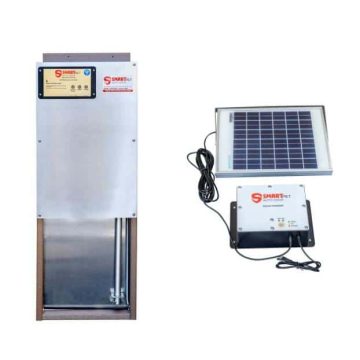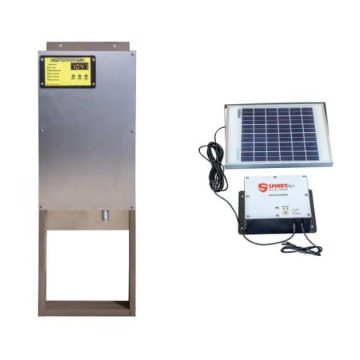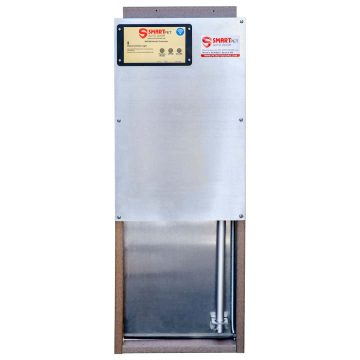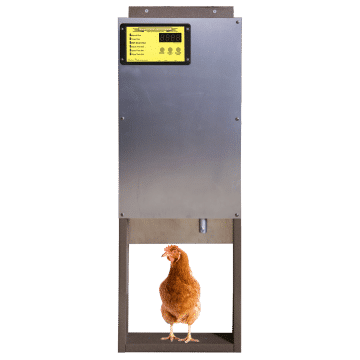
Raising chickens means balancing convenience, safety, and the needs of your flock. One upgrade that’s become increasingly popular among backyard chicken keepers is the automatic chicken coop door. These doors open and close on their own, giving your hens a safe and consistent routine without you having to be out there every morning and evening.
But when it comes to choosing the right door, there’s one key question: Should you go with a solar-powered chicken coop door or an electric model? Both options come with their own set of benefits and drawbacks. In this guide, we’ll break down how each one works, what to consider before buying, and how to choose the best fit for your coop and lifestyle.
What Are Automatic Chicken Coop Doors?
Automatic chicken coop doors are exactly what they sound like: doors that open and close on a timer or during sunrises and sunset to let your chickens in and out without you needing to do it manually. These doors improve flock security by closing at dusk to keep predators out and opening at dawn so your chickens can roam freely.
Available in various styles and powered in different ways, automatic doors are an excellent solution for busy farmers, weekend travelers, or anyone who values consistency in their chicken care routine.
Solar Powered Chicken Coop Doors

How Do They Work?
Solar-powered chicken coop doors use a small solar panel to collect energy from the sun and store it in a battery. That battery then powers the motor that opens and closes the door based on your settings, like a timer. These systems are typically plug-and-play, with mounting hardware included, and can often be installed in under an hour.
Advantages
- Off-grid functionality (ideal for rural/backyard setups): Solar is a practical option if your coop is in a remote area or far from your home. You won’t need to run power cords or worry about finding an outlet.
- Eco-friendly and energy-saving: Solar energy is renewable and clean. Using it to power your coop door reduces your overall energy consumption and helps shrink your environmental footprint.
- Useful in areas without reliable access to electricity: Many backyard coops don’t have electrical wiring. A solar door gives you automation without needing professional installation.
Disadvantages
- Less effective in low sunlight or heavily shaded areas (coop placement is key): If your coop is in a heavily shaded spot or you live in a region with long stretches of cloudy weather, the solar panel may not get enough charge to keep the door running consistently.
- Battery maintenance and occasional solar panel cleaning: You may occasionally need to replace the battery or clean the panel to ensure it’s working efficiently.
- The initial cost may be higher depending on the brand: Solar-powered models can be a bit pricier upfront compared to their electric counterparts, depending on the brand and features.
Electric Chicken Coop Doors

How Do They Work?
Electric chicken coop doors plug into a standard power outlet and draw energy directly from your home or barn’s electrical system. Some models also include backup batteries in case of short-term outages. Like solar doors, they can operate on timers, when the sun is out, or manual controls.
There are a couple of great electric options, depending on your preferences. We offer WiFi/Bluetooth chicken coop doors, giving you full control from your smartphone, no matter where you are. You can schedule door openings and closings, check status updates, and make adjustments on the fly with the app. It’s an excellent pick for pet owners or backyard chicken keepers who want convenience at their fingertips.
For a more straightforward solution, our built-in timer chicken coop doors allow you to set it and “forget it”. It automatically opens and closes based on your settings or available daylight, with no need for internet or app controls. Some models also include a backup battery so your flock stays protected even during short power outages.
Advantages
- Reliable, consistent power source: Electric doors don’t depend on sunlight or a battery charge, making them more consistent in areas with unpredictable weather.
- No need to worry about sun exposure or battery life: Without solar panels to clean or batteries to monitor, electric models often require less upkeep.
- Often slightly cheaper than solar models: These doors are often a bit less expensive than solar-powered options, making them more budget-friendly for first-time buyers.
Disadvantages
- Requires access to electrical outlets: If your coop is located far from a power source, running electricity to it can be costly or inconvenient.
- Not suitable for off-grid locations: For fully off-grid homesteads, electric models may not be practical unless you’re willing to invest in wiring or a generator.
- Power Outage Risk: In the event of a power outage, your door may stop working unless it’s equipped with a backup battery.
Key Factors to Consider When Choosing Which Option Is Right For Your Flock

Before you make a decision, consider the following points. Choosing the right automatic chicken coop door isn’t just about power source, it’s about what works best for your daily routine, your birds’ safety, and your property layout.
Location of Your Coop
If your coop is in a rural area or set back from the house, solar might be the more convenient choice. If it’s near a power source, an electric chicken door can offer more consistency.
Access to Electrical Power
If you already have a power line running to your coop, an electric model can save you money. If not, installing a solar-powered door may be easier and more cost-effective than running new wiring.
Weather & Sunlight Conditions
Live somewhere cloudy or heavily shaded? Electric may be a safer bet. On the other hand, sunny climates are ideal for solar-powered models.
Budget
Solar doors often have a higher initial cost, but they save on utility bills. Electric models tend to be cheaper upfront but may involve ongoing electricity use and installation costs.
Installation Difficulty
Most doors are fairly easy to install, but solar setups may require more precise placement to ensure proper sunlight exposure. Electric doors, meanwhile, require proximity to a reliable outlet or additional electrical work.
Desired Features
Consider if you want features like automatic locking, remote controls, or backup batteries. Some premium models, both electric and solar, offer advanced features that can be worth the investment.
Cost Comparison
| Chicken Coop Door Type | Average Price Range | Long-Term Cost | Best For |
| Solar-Powered | $450+ | Low | Off-grid, rural, eco-conscious users |
| Electric-Powered | $320+ | Moderate | Consistent power access, budget-friendly |
While a solar-powered chicken door tends to cost more upfront, they can save you money long-term by using free solar energy. Electric doors are more affordable initially, but they may add a small amount to your utility bills.
Which One Is Right For You?

There’s no one-size-fits-all answer—it depends on your setup. A solar-powered door is great for off-grid coops or cutting energy use, while an electric door offers reliable, year-round performance.
Our automatic chicken coop doors make life easier by opening and closing on a timer or with natural light. Built in the USA with weather-resistant materials and safety features like obstacle detection, they’re designed for all seasons and are easy to install.
Ready to simplify your routine and protect your flock? Browse our automatic chicken doors today!







